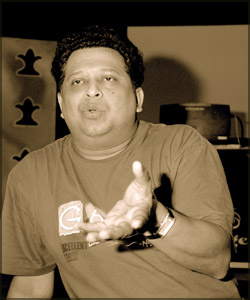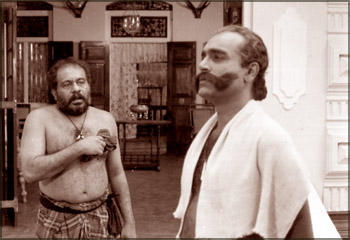Transcending synthetic barriers which divides people from people
Dutugemunu as a symbol of racial harmony:
 Jayantha
Chandrasiri is an unconventional teledrama director and film maker, who
has explored myriad of social issues with deep insights into geneses of
them. He is best know for his path defining teledramas such as Weda
Hamine and films such as 'Guerilla Marketing' which offers insight into
the overarching influence of consumerism and society dictated by wimps
and fancies of media and vigorous marketing. His latest venture on king
Dutugemunu will portray the much talked about historical figure in an
entirely different light as a vanguard of reconciliation and racial
harmony. Jayantha
Chandrasiri is an unconventional teledrama director and film maker, who
has explored myriad of social issues with deep insights into geneses of
them. He is best know for his path defining teledramas such as Weda
Hamine and films such as 'Guerilla Marketing' which offers insight into
the overarching influence of consumerism and society dictated by wimps
and fancies of media and vigorous marketing. His latest venture on king
Dutugemunu will portray the much talked about historical figure in an
entirely different light as a vanguard of reconciliation and racial
harmony.
This is the first time Jayantha discusses on
his production Dutugemunu in detail with media
Q: Looking back on your career which commenced with theatre,
with 'Sarasvathi' in 1979 and with plays such as 'Oththukarayo', how do
you perceive the changes that occurred in contemporary Sri Lankan
theatre?
A: 'Sarasvathi' was the outcome of training and knowledge of
drama acquired through a workshop conducted by a German Trainer to
produce a team of professional actors and actresses. He selected twenty
five youth through advertisements on media and I was one of them.
However, I believe my career in drama commenced with 'Ath' produced in
1985. At the time I perceived drama as a weapon which could penetrate
the complex society and enlighten the audience of the reality. On the
other hand, actors like Kamal Addaraarachchi, Jackson Anthony and
Sriyantha Mendis who played different roles in my dramas, were motivated
by series of workshops I conducted at Shalika hall.

Compared with dramas in 1970s, I do not see much contextual
difference in contemporary dramas; as in those days, today adaptations
are made and translations of dramas are done. However, the weaknesses in
original plays which were in 1960s and 1970s, are still there and some
of the original dramas are weaker on many aspects to original dramas
produced in 1970s.
'Ath' was highly appreciated by critics such as Sugathapala de Silva,
Ajith Samaranayake and Tissa Abeysekara. It was rather unconventional
and most of the critics did not understand the play. Sugathapala de
Silva, Ajith Samaranayake and Tissa Abeysekara prepared the audience. 'Ath'
became a model. Though I did not produce adaptations or translations, in
fact my all three dramas were original productions; I read and watched
large number of translations and adaptations of dramas.
Except Jayalath Manoratne who produced scores of original dramas
including 'Lokaya Taniyayak', 'Talamala Pipila', 'Guru Taruwa' and
Rajitha Dissanayake's original productions, I do not see any leap of
development in original dramas produced in Sri Lanka. Though Jayalath
Manoratne produced translations and adaptation, his most potent
expression is in original productions. I believe that original dramas
have still space for improvement. A large number of translated dramas
were produced and I would think they were very successful, especially
translated dramas by Dharmasiri Bandaranayake and Prasanna Vithanage.
They became subjects of public discourse but I still believe in
producing original dramas.
Q: Your subsequent entry into the medium of television with
award wining teledramas such as "Weda Hamine", 'Dadubasnamanaya', 'Akala
Sandaya' and "Rejana' not only marked an important milestone in your
career but also in Sinhala teledrama which was more or less , confined
to a triangular formula woven around middle class families and their
day-to-day gossip. As a director, how do you assess the contribution
that your teledramas made in terms of changing perception of the media
teledrama in Sri Lanka?
A: From the very beginning of my teledramas I thought of
making a change to the existing formula of teledrama scripts. By the
time, there were some notable experiments that had been done with
teledramas such as Damma Jagoda's 'Paligu Menike', Parakkrama Niriella
'La Hirudahasak' and D.B Nihalsinghe's 'Dimutu Mutu' which was the first
teledrama. Most of them were of the view that teledrama was not a
creative medium.
By then television viewers were around five hundred thousand and now
it is over 800, 000, 00 and I had the question how if it could not be an
art. With the experience in theatre and knowledge of cinema acquired
through reading and watching and self-study of films, I entered the
production of teledramas. As 'Weda Hamine' was not compatible with the
formula of teledramas of the day, sponsors were reluctant to finance the
teledrama. It was produced by Sunil Ratnayake on behalf of Teleview and
People's Bank came forward to sponsor the teledrama without any
advertisement shown in the middle of the teledrama.
|

‘Dadubasnamanaya |
I firmly believed that teledrama is a medium of art and wanted to
break the formula where the teledrama is revolved around middle class
family issues. I wanted to present a creation which stirred imagination
of the audience.
'Weda Hamine' is aimed at depicting the rise of elites in a symbolic
manner.
I think my contribution was to take the audience towards a new
dimension.
When I produced the next teledrama 'Vesmuna' I had no problem of
finding sponsors. A lot of people could not watch the teledrama as it
was the first teledrama telecast on MTV which was telecast on UHF for
the first time in Sri Lanka.
'Dadubasnamanaya' became a hit and it became the best and most
popular teledrama at the first Sumathi Teledrama awards. Earlier cinema
actors/actresses and directors were reluctant to engage in the
production of teledramas. But subsequently they came into the medium.
Q: Perhaps, the most famous or controversial film you made was
'Guerilla Marketing' in which you severely criticize the system and
power of media over people in influencing their ideas and formation of
perceptions. Most critics drew parallel with a certain politician who
had a similar coaching by a team of Public Relation experts similar to
the pre-election coaching of Gregory Maha Adikaram. Among other things,
you have highlighted the inseparable nexus among politics, media and
marketing. Do you think that Sri Lankan audience grasps the embedded
message in the film?
A: I believe that society has been transformed from a consumer
society into media society. That does not mean that consumer society is
withered away.
The common feature of this consumer society dictated by marketing has
no commercial discipline. The developed world also has consumer or
marketing society. The difference between consumer society in Sri Lanka
and those societies is that these societies function under a commercial
discipline.
Good and services in Sri Lanka is of inferior quality compared to
developed societies. We always get the duplicates. It is also valid to
art. I saw this tragedy. Politician has also acted as merchant and his
customer is the voter. Most of the people could not understand the
underlined message in the film. False good and false images become the
order of the day. Ultimately what are left behind are only pseudo values
and images. I used schizophrenia as a potent metaphor. The patient
imagines that he or she speaks with a fantasy and interacts with it.
Though we are not patients we also live under the spell of this fantasy.
As an artist I wanted to destroy this.
Q: I gathered that you have embarked on making a film on the
legendary king Dutugemunu. Dutugemunu was the king who united the
country defeating the Tamil king Elara. In the present context how would
it be receive by the audience? Does it in the long run hamper the ethnic
harmony in the county and would be used as a weapon by racists to fan
communal hatred?
A: The film 'Dutugemunu' is being created not as a work that
would damage ethnic harmony but as a creation that would really enhance
harmony among diverse races. Although I can not spell out the modus
operandi of achieving this, I could state the scope of the subject is
defined with a universal ideology.
We have large number of heroes in Sri Lankan history. However,
Dutugemunu is the only righteous hero. He does not fight for material
gains but to protect a humane ideology. I believe that Buddhist
philosophy is the only ideology which serves the well being of all. That
does not mean that there are no other great philosophies. If one is
dedicating his life for the protection of that philosophy he is a
righteous hero. Dutugemunu's war is not a physical war and it is not the
war that rulers perceive. The story of this righteous hero that I am
going to create therefore would be universally applicable.
Q: "Dutugemunu" would be an epic film with a lot of dramatic
situations.
Have you already done research into the historical figure of king 'Dutugemunu'
and the period in which he lived?
A: There is a belief in Vedic philosophies that if one dies
for the protection of that philosophy; he would be born in heaven. But
according to this philosophy even if you fight to protect it you will be
born in hell if you kill people.If one is fighting for the protection of
Dhamma, he would eventually spend more time in the never ending circle
of birth and death. So it is a great sacrifice. Dutugemunu knows this
and therefore he is a righteous hero. I have already gathered all the
material to prove this. He is an extraordinary hero. When the prince
Dutugemunu is in hiding in Kotmale, he falls in love with a village lass
Ranmenika and he eventually marries her. When he becomes king, he makes
Ranmenika the queen.
When Ruwanwali Seya was built, king Dutugemunu imposed a degree that
those who work in the construction should be paid for the work. He
should, surely, be an extra ordinary personality. Another fact that
vindicates this is that king Dutugemunu stops the march at Anuradhapura
and invites king Elara for a duel in order to protect the lives of Tamil
elites and Elara's relations who would otherwise be destroyed in an
attack on them in Anuradhapura. What would happen if Dutugemunu would
defeated in the duel? All that was gained through war would be of no
value.
Q: How significance is the character of king Dutugemunu in the
present context?
A: I based the film, by and large, on legends. In addition, I
have used all editions of Maha Vamsa and Deepavansa, Thupavansa,
Rajavaliya, Rasavahiniya and legend. I have taken a long time to
research on the subject. At first, my idea was to make a teledrama on
king Dutugemunu. But I thought later that the story is more suitable for
the medium of cinema. I have also read most of the fictions on king
Dutugemunu. It is relevant in the present context because of the aspect
of ethnic harmony in the story.
The character king Dutugemunu is a great humane character endowed
with human qualities. It is about a historical figure who promotes
ethnic harmony. To achieve that end, he has used not politics but humane
qualities. I believed that this hero has been hidden in history and in
fact, he is virtually turned upside down by some elements due to
misconception. What I am going to do is to make the character stand on
his feet.
Q: Have you already selected the cast for the movie?
A: I have not yet finalised the cast.
Q: How do you perceive the character of King Dutugemunu and
his abiding influence of racial relations in Sri Lanka?
A: The story of Dutugemunu can be used to enhance racial
harmony. In fact, it is one of the objectives of the film. Though the
task of the artist is not to solve social issues, artist can interpret
and analyse them. The weapon that can be used to solve national question
is wisdom and the hero who provides that wisdom is Dutugemunu. There are
host of heroes who salvaged Sri Lanka from invaders. Elara was a
Machiavellian and he could have brought the country under his fold. But
two great characters king Kawantissa and Dutugemunu foiled this
Machiavellian politics and established righteous politics. This will
contribute to promote ethnic harmony. There is no racism in the story.
Respecting Elara's tomb is not only a mark of respect to Elara but to
respect the living and Tamils. No one was banished but integrated into
the administration and that is the unification. King Dutugemunu built a
kingdom that all of its citizens could enjoy life in it. That is the
story of Dutugemunu.
|

